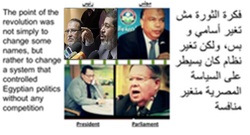Let us stop relying on new names/faces to be better than those before them rather than changing the system to ensure that the new politicians cannot repeat past transgressions. Ensuring competition and setting up checks/balances is the first step in doing so.
I tend to believe that, if Clinton, Kennedy, Chirac, etc. - or most "great" world leaders - were in systems that enabled them to be dictators and command unbridled power they would have. It is not that French or American or Indian politicians are inherently "better" or less corrupt than their Egyptian counterparts but rather that the system is setup to prevent them from indulging in these tendencies.
- Active competition weakens the ability of any one interest or faction to dominate its own arena and to intrude unduly upon the workings of the other. Moreover, citizens who have real economic and political alternatives will be less vulnerable to exploitation, and thus in a better position to resist corruption and respond effectively to it.
- In the US, the seperation of powers and bicameralism are competitive devices, as are the system of checks and balances implemented through the constitution.
- When protected from competition, even talented and well-intentioned public officials are motivated to act in ways intended to increase their income, authority, prestige, or leisure (Borcherding 1977).
- Competition brings out the best in people and organizations, not because it appeals to greed or selfishness, but because the desire to innovate, earn the esteem of others, and be best in one’s field is deeply and widely instilled (Olson 2000; Novak 1996).
- “[Competition is] superior not only because it is in most circumstances the most efficient method known but even more because it is the only method by which our activities can be adjusted to each other without coercive or arbitrary intervention of authority.” (Hayek, The Road to Serfdom)
- "Democracy is a competitive political system in which competing leaders and organizations define the alternatives of public policy in such a way that the public can participate in the decision-making process." (Schattschneider, 1960)
- "Modern political democracy is a system of governance in which rulers are held accountable for their actions in the public realm by citizens, acting indirectly through the competition and cooperation of their elected representatives." (Schmitter and Karl, 1991)


